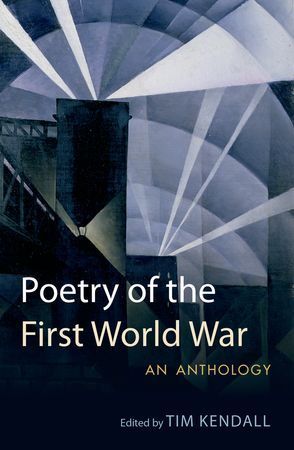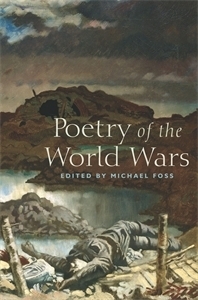The poets at war (and in anthologies)
By MICHAEL CAINES
Remembrance Sunday approaches – the moment when newspapers make the costly mistake of forgetting that not all war poets are out of copyright (Robert Graves, for example, only died in 1985), and others, monotonously schooled in Wilfred Owen et al, groan at the familiarity of it all, and think of Captain Flashheart in Blackadder Goes Forth, sick, or so he claims, of “this damn war: the blood, the noise, the endless poetry”. . . .
Others, less cynical, more respectful of the obvious centenary (war being declared on July 28, 1914), will pay the full price of £14.99 for one out of this autumn’s advance guard of war poetry anthologies (and to think they could be paying a few pounds less for a proper new collection of verse, John Greening’s To the War Poets): Michael Foss’s (reissued) Poetry of the World Wars, Tim Kendall’s Poetry of the First World War, and Carol Ann Duffy’s 1914: Poetry remembers.
There should be more, in greater depth, about this subject in the TLS itself in due course, starting with a review of Randall Stevenson's Literature and the Great War 1914–1918 in this week's issue. For now, though, I’ll just note that Tim Kendall introduces his selection from In Parenthesis with this paradox: “Among the most significant poets of the War, David Jones proves by far the most difficult to anthologize”.
In another literary context, such a statement might seem bizarre – but Kendall’s anthology is in fact exceptional in acknowledging that other kinds of poetry exist besides short, anthology-friendly and often relatively undemanding lyrics. (Short in this context meaning under a page, two at the most.) Foss’s Poetry of the World Wars ignores Jones altogether.
Generally speaking, as my colleague Robert Potts has eloquently argued, anthologies tend to be allergic to complexity, especially in long poems, and to the kind of poetic complexity that works across a unified volume by a single writer. Compilations produced since 1918 can sometimes make it seem as though the Iliad never existed. David Jones, incidentally, started writing In Parenthesis around 1928, when Robert Graves and Laura Riding published their Pamphlet against Anthologies.
In Parenthesis, to take a prime example, is closer in spirit to the work of one of its most ardent admirers, T. S. Eliot, than to the more “accessible” or “traditional” verses of, say, Rupert Brooke or Edmund Blunden. Its significance does not lie in providing easily digestible poetic soundbites.
How then is it best for an anthologist to arrange the borrowed wares? Foss’s Poetry of the World Wars organizes its poets in historical phases: “World War One” opens with “Call to Arms: ‘Men Who March Away’” (featuring Hardy’s “Men Who March Away” and Brooke’s “The Soldier”), before moving on, through “Combat”, “Disgust” and the rest, to the aftermath. “World War Two”, after a brief interlude, follows a similar pattern. Two more distinguishing features: the book is illustrated, although not, apparently, by anyone who needs an acknowledgement; and it tells you nothing at all about the poets as individuals apart from what you might infer from the poems themselves.
That reticence about biographical information and the anti-individualistic structure of the book contrast with Kendall’s Poetry of the First World War, in which the poets take precedence over historical events in the orthodox way, being ordered by year of birth (1840 to 1898) and confined to separate sections – anthologies within the anthology. Hardy provides the opening number here, too, and the book closes with a selection of anonymous “music-hall and trench songs” – but thanks to Kendall’s headnotes, you can also read, say, the poems of May Wedderburn Cannan in the context of her life, ruined as it was by the war that she, who served both in a soldiers’ canteen in Rouen and for MI5 in Paris, had continued to support: her fiancé, the son of Arthur Quiller-Couch, would hardly have died of pneumonia in Germany, in 1919, if it hadn’t been for his military obligations. Walter de la Mare reviewed her collection of that same year for the TLS, and found it artless yet “full of tenderness”.
In 1914: Poetry remembers, meanwhile, thirty-odd twenty-first century poets offer companion pieces to poetry and prose by a wide range of war poets, a few of whom have been selected twice (one of them is Ivor Gurney, my own favourite among the war poets). This means that the “anthologists”, with Carol Ann Duffy at their head, slightly outnumber the “anthologees”. There are poems concerned directly with the First World War, with Private Isaac Rosenberg “writing his poetry by candle ends” (Elaine Feinstein) and Private Henry Muldoon in Gallipoli (guess who), but also more recent moments of conflict: the word “redacted” crops up, as does the name Jean Charles de Menezes. As John Agard puts it in “Bandages” (channelling Shylock?): “how alike all people bleed”.
Peter Stothard's Blog
- Peter Stothard's profile
- 30 followers






